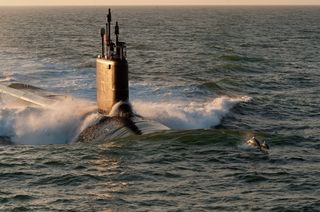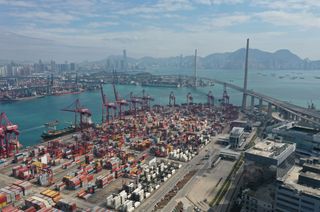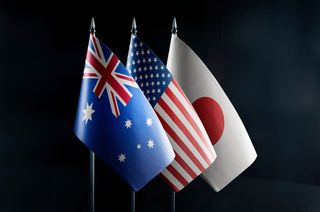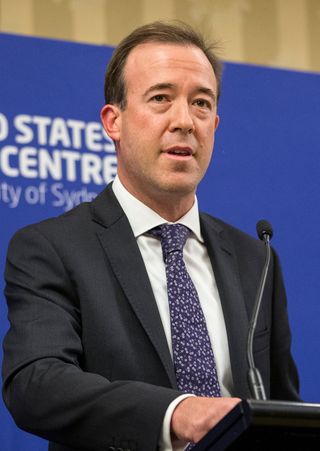The Australian, publishing an excerpt from The Monthly
By James Curran
How a letter about Vietnam from the new prime minister nearly derailed our alliance with the US
On the crisp morning of December 20, 1972, an Australian diplomat arrived at the entrance to the White House's West Wing to deliver an urgent letter from his new prime minister, Gough Whitlam. Addressed to president Richard Nixon, the letter laid out Whitlam's response to the United States' so-called ''Christmas bombings'' of Hanoi and Haiphong, North Vietnam's major population centres.
The military offensive had been Nixon's attempt to break the will of the North Vietnamese at a time when its leaders were deemed unresponsive to renewed American pressure for peace. As US national security adviser Henry Kissinger had remarked to Nixon, 100 B-52s was akin to ''a 4000-plane raid in World War II . . . it's going to break every window in Hanoi''.
Little wonder The Washington Post characterised the attacks as ''the most savage and senseless act of war ever visited, over a scant 10 days, by one sovereign people over another''.
The bombings provoked worldwide condemnation, including from the Swedish prime minister, Olof Palme — long a stone in Washington's shoe — who compared them to other notorious ''outrages'' such as Katyn and Treblinka. As Kissinger later recalled, even Moscow and Beijing were more restrained.
Whitlam's private words to Nixon were mild by comparison — he questioned ''most earnestly'' whether the resumption of the bombing would achieve ''the return of the North Vietnamese to the negotiating table in a more forthcoming frame of mind''.
However, towards the end of his letter, Whitlam signalled his intention to invite other East Asian nations to join Australia in issuing a public appeal to both the US and North Vietnam to return to peace talks. He further hinted that while he would not make such an appeal public, he might have to let the Australian people know that a stern letter of protest had been sent.
After all, his party had opposed the war since Robert Menzies had committed troops in 1965. Whitlam had once called it the ''war of the great lie'' and wanted to ''assist the American people in the liquidation of the war they had come to hate''.
Now in power, some senior ministers shelved any pretence of moderation. In the wake of the bombings, they accused the White House of being ''maniacs'' and ''acting with the mentality of thuggery''. Jim Cairns called it ''the most brutal, indiscriminate slaughter of women and children in living memory''.
Australian maritime unions placed a ban on all US shipping in Australian ports, a move reciprocated by the US International Longshoremen's Association.
US officials were aghast. They had long feared the advent of a left-of-centre government in Australia. Certainly they'd never quite seen a letter like Whitlam's from an Australian leader. John Gorton had complained to Lyndon Johnson about the lack of co-ordination over the withdrawal of troops from Vietnam. Billy McMahon had expressed consternation at not being forewarned about the announcement that Nixon would visit China. But these episodes had hardly threatened the ANZUS alliance.
From Washington's perspective, Whitlam had done the unthinkable. He had put the US on the same level as its communist enemy.
Whitlam's letter had landed first on the desk of Winston Lord, a senior Asia specialist under Kissinger. Lord immediately instructed the State Department to start warning key Asian capitals, especially Tokyo and Jakarta, of a possible Australian initiative on the peace negotiations.
The Nixon administration, already under pressure to bring the war to an end (and under pressure as well from the Watergate scandal), felt Australia's proposed action might derail the chances for a negotiated settlement with Hanoi, which Kissinger had been painstakingly working towards.
Kissinger, ever the Bismarckian realist, responded with a blunt, forceful warning. At 3.25pm that same day he rang the Australian ambassador, James Plimsoll. But Plimsoll had already slipped away, departing Washington earlier that afternoon for consultations with Whitlam back in Canberra.
Instead, Kissinger was put through to the embassy's No 2, Roy Fernandez. Pleasantries were sparse. Kissinger's opening was ominous: ''About the letter of your prime minister.'' He went on: ''I don't know how I can tactfully convey something which we don't want to have officially recorded, is that possible?'' Fernandez agreed in haste. ''If you could convey that we are not particularly amused being put by an ally on the same level as our enemy . . . I must tell you it's not the way to start a relationship with us.''
If Whitlam's intention became public, he added, ''it must have great consequences for our relationship''. Kissinger hardly needed to spell it out. He was talking about the future of the US-Australian alliance.
Examining the official record of this exchange 40 years later, one can almost sense Fernandez quivering. All he could do was scribble furiously and keep saying ''Yes''. Sometimes, even, a hastier ''Yep''. He undertook to convey the essence of the conversation to the head of the Foreign Affairs Department in Canberra, Sir Keith Waller. ''I'll get this back for sure, Dr Kissinger,'' Fernandez pledged.
And that was it. The call was so swift and brutal that the White House staffer who typed up the verbatim transcript misspelled the Australian capital as ''Kenbrook'' and Waller, eminence grise of Australian diplomacy, as ''skeef walla''.
Kissinger made clear that the Americans would not officially reply to Whitlam's letter. They could not bring themselves to bestow any sort of dignity on the message — something they did do for the New Zealand prime minister's letter of protest over the bombings.
What the Australians received instead was Fernandez's summary of Kissinger's icy blast. As Waller, accustomed to more formal diplomatic niceties, said at the time, he had ''never seen such language'' in a communication from one government official to another.
White House tapes — found in the Nixon Library and until now unknown to Australian researchers — reveal that Kissinger, in a private phone conversation with Nixon on December 29, dismissed Whitlam's letter as a ''cheap little manoeuvre'' and an ''absolute outrage''.
The proposed joint appeal to the US and North Vietnam was derided as a sop to leftist gadflies — a ''grandstand play'' for domestic public opinion. It was, Kissinger added, ''very dangerous, and very stupid, too''.
In classic realist style, he moved seamlessly from denunciation of his opponent to the ultimate power equation: from ''the minute the Vietnam war ends'', he quipped, the Australians ''will need us one hell of a lot more than we need them''.
Nixon could only agree: for Whitlam to ''imperil'' his country's relations with the US was ''one hell of a thing'' to do.
In that conversation, Nixon and Kissinger agreed to ''freeze'' Whitlam ''for a few months'' so that he would ''get the message''.
Nixon insisted all contact with the Australian ambassador be avoided, that no New Year's messages be sent to the Australian prime minister and, concerned that the State Department might run an alternative agenda, that all cables to Canberra be cleared through Kissinger's office.
Whitlam, Nixon fumed, was ''one of the peaceniks . . . he is certainly putting the Australians on a very, very dangerous path''.
The signing of the Geneva peace accords at the end of January 1973 and the ending of the maritime union bans helped ease relations, but the White House was determined to make Australia pay. Besieged by Watergate, Nixon stubbornly delayed inviting Whitlam to visit the White House for nearly five months. The delay was all the more significant as Nixon had agreed to host the Soviet Leonid Brezhnev about the same time.
The leader of the opposition, Billy Snedden, even wrote to Nixon to convey his concern that a refusal to grant Whitlam a meeting could be ''misrepresented as a slight to the Australian people''.
Meanwhile, The New York Times ridiculed Nixon's behaviour as a ''foolish display of public petulance towards a friend and ally''.
Nixon appointed Marshall Green, the State Department's top Asia specialist, to be the new ambassador to Australia. At Green's farewell lunch, Nixon told him, ''Normally, I wouldn't send you to a place like Australia, but right now it is critically important.'' Nixon spoke disparagingly of Whitlam, finally saying: ''Marshall, I can't stand that . . . (string of expletives).'' As Green later recalled, it was a ''strange kind of parting instruction to get from your president''.
It took a special visit to Washington in May 1973 by Whitlam's private secretary, Peter Wilenski, to smooth the ruffled feathers and secure a July visit.
Wilenski set out the new Labor government's world view in broad terms. Whitlam, he said, was ''freed from [the] constraints'' that had characterised the Australian foreign policy debate over the previous two decades, namely the ''fear of communist hordes and the gravitational theory'' (the idea that Asian communism would inevitably spread to Australia).
Whitlam didn't want Australian troops in Asia but still wished to maintain a regional stance and adequate defence spending. Wilenski added: ''An American alliance is the background for these things,'' leaving the White House in no doubt that this was a new broom in Australian politics.
Once the staunchest of Cold War allies, Australia was now saying explicitly that ANZUS alone did not constitute its foreign policy. Kissinger reminded Wilenski that the relationship with the new Australian government had started ''inauspiciously''. ''We take great umbrage,'' he explained, to ''be put on the same level as Hanoi. It seemed gratuitous and unreal, and therefore, we never answered.'' There was a ''very bad feeling here toward your prime minister, particularly because the president has a warm spot towards Australia''.
Nixon agreed to the Whitlam meeting only because Kissinger had stressed this was necessary to ''keep Whitlam in line'' on Asia policy. Also, Green believed the delay in extending the White House invitation had made the Labor leader ''sweat a bit'' and now was the time to ''broaden'' his regional vision.
The White House briefing notes prepared for the Whitlam visit reveal a sense of relish among senior Nixon aides regarding the opportunity to lecture the errant Australian leader on how the world really worked.
What troubled the Americans the most was Whitlam's criticism of SEATO — the Southeast Asia Treaty Organisation established in 1954 to contain communist China. Whitlam had labelled it moribund and wanted it disbanded.
For the Americans, however, the treaty guaranteed their access to Thailand, and they warned Whitlam repeatedly that taking pot shots at SEATO could affect ANZUS unfavourably.
The White House was also troubled by Whitlam's advocacy for a new grouping of non-aligned nations in Asia and for zones of peace in the Indian Ocean — ideas consistent with Whitlam's vision for a region free of superpower rivalry.
Whitlam felt an imperative to remove Australian ground troops from Southeast Asia, but Kissinger saw a possible security vacuum and wanted the troops to stay put.
As Kissinger put it to Nixon, Whitlam had to be told ''that the inter-relationship of our two Asian policies is not a question falling completely outside ANZUS''. The administration simply couldn't stomach the way Whitlam ''vigorously resisted any suggestion that the alliance carried any obligation to support major US policies in Asia''.
Green called Whitlam a ''whirling dervish'' who had been ''moving on matters of vital interest to the US without the prior consultation that we have come to expect from Australia''.
Ultimately, Whitlam's Asian initiatives ran into the sand. He agreed not to withdraw from SEATO, decided not to remove Australian squadrons from Malaysia and struggled to gain any regional traction for his idea of a new Asian grouping.
When Whitlam at last met Nixon in the Oval Office at the end of July, he appeared to fall back into line. Before the meeting, he confided to Kissinger that any new Australian prime minister still had to ''get his legitimacy within the first few months by gaining accolades from the White House''. After receiving a mini lecture from Nixon on the need to ''stand together against predators'' in the region — the very type of old Cold War language that Whitlam abhorred — he nevertheless reassured his host that ''Australia's effectiveness in its relations with Asia depends upon good relations with the US''.
Yet in public Whitlam maintained his position that Australia needed a ''more mature, less adulatory'' relationship. In essence, Whitlam wanted the Americans to consider the different needs and interests of its ANZUS allies.
It is testament to just how much Labor got under Nixon's skin that he gave real thought to abandoning ANZUS. Little over a month before he resigned from office, Nixon ordered a top secret study of American relations with Australia. He asked his advisers to explore options for relocating key American intelligence installations in Australia elsewhere, assess ''the impact on our alliance with Australia of curtailing or ending intelligence sharing'', and analyse the ''prospects for growing divergence between Australian and US policy in Asia and elsewhere''.
These old war stories barely feature in today's debate over the future of the alliance in the face of a rising China. We are constantly reminded that Australia faces an entirely ''new'' and ''unprecedented'' strategic dilemma: having a major economic partner that is not its strategic guarantor.
Significantly, the Fraser, Hawke and Keating governments followed Whitlam's example by keeping the alliance at the centre of Australian security policy while devoting the bulk of their creative energies to comprehensive engagement with Asia.
In recent times, however, both Kevin Rudd and Julia Gillard have been quick to wrap themselves in the Stars and Stripes. Concerned their commitment to the alliance might appear suspect, both have fallen over themselves to appear unwaveringly pro-American.
Similarly, blogging as a private citizen in November last year, Bob Carr raised reasonable, rational questions about Gillard's agreement to station a permanent American military presence in northern Australia. When he was appointed Foreign Minister the following March, however, these views were quickly and quietly disposed of.
What the Whitlam experience shows is that the relationship can survive periods of discord and divergence.




